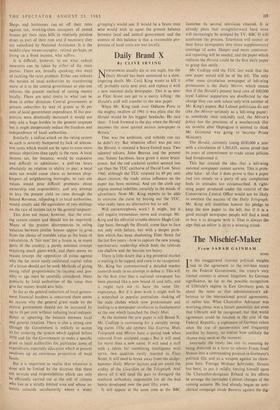Daily Brand X
By CLIVE IRVING
NEWSPAPERS usually die in one night, but the Daily Herald has been sentenced to a slow, lingering death. Mr. Cecil King wants to kill it off, probably early next year, and replace it with a new national daily newspaper. This is as near as Fleet Street can get to a mercy killing: the Herald's staff will transfer to the new paper.
When Mr. King took over Odhams Press in the mighty swallow of 1961 it was plain that the Herald would be his biggest headache. He said then: 'I look forward to the day when the Herald becomes the most quoted serious newspaper in Britain.'
That was , the ambition, and nobody can say he didn't try. But whatever effort was put into the Herald, it retained a heavy-footed aura. Two talented editors, John Beavan and the present one, Sidney Jacobson. have given it more brain- power, but the red cockerel symbol seemed less apt than the TUC carthorse of David Low. Since 1960, although the TUC retained its 49 per cent share interest, the trade union influence on the paper has been minimal. And yet the cloth cap stigma seemed indelible, certainly in the minds of advertisers. Now Mr. King expects to be able to exorcise the curse by buying out the TUC, who really have no alternative but to sell.
Will metamorphosis work? It might, but it will require tremendous nerve and courage. Mr. King and his editorial trouble-shooter Hugh Cud- lip.p have, through the Herald, come face to face not only with failure, but with a deeper prOb- lem which has been shadowing Fleet Street for the last five years—how to capture the new young, meritocratic readership which finds the tabloids too shallow and the heavies too heavy.
There is little doubt that a big potential market is waiting to be tapped, and even to be recognised. Mr. King has commissioned a detailed market research study in an attempt to define it. This will be the first time that a national newspaper has been planned like a new brand of iced lolly, and it might turn out to have the same life- expectancy. But if it does work it might well be a watershed in popular journalism, shaking off the stale clichés which now predominate and leading to a newspaper revolution as fundamental as the one which launched the Daily Mail.
At the moment the new paper is still Brand X: Mr. Cudlipp is canvassing fOr a suitably swing- ing name. (The old epithets like Express, Mail, Telegraph and Mirror have a period look when removed from accepted usage.) But it will need far more than a new name. It will need a staff with a, talent for combining intelligence with verve, two qualities rarely married in Fleet Street. It will need to break away from the sledge- hammer Daily Mirror layouts and yet avoid the aridity of the Guardian or the Telegraph. And above all it will need the guts to disregard the textbook orthodoxy responsible for all the bad habits developed over the past fifty years.
It will appear at the same time as the BBC launches its second television channel. It is already plain that straightforward hard news will increasingly be scooped by TV; BBC II will accelerate the process. Television will sooner or later force newspapers into more supplementary coverage of news. Deeper and more controver- sial reporting will be needed, and the paper which replaces the Herald could be the first daily paper to grasp this nettle.
Mr. Cudlipp told the TUC last week that the new paper would still be of the left. The only other mass circulation newspaper of left-wing pretensions is the Daily Mirror, which means that if the Herald's present hard core of 600,000 loyal Labour supporters are disaffected by • the change they can seek solace only with another of Mr. King's papers. But Labour politicians do not take the Mirror seriously as a left-wing paper: as somebody once unkindly said, the Mirror's policy has the precision of a weathercock (for six months after Orpington it seemed to think Mr. Grimond was• going. to become Prime Minister).
The Herald, currently losing £830,000 a year with a circulation of 1,301,631, seems proof that its years of commitment to trade union policies had foredoomed it.
This has created the idea that a left-wing national newspaper cannot survive. This is prob- ably false: all that it does prove is that a paper tied too closely to a party of any complexion finds its attitudes too circumscribed. A right- wing paper produced under the control of the• Conservative Central Office would not be likely to emulate the success of the Daily Telegraph.
Mr. King will doubtless honour his pledge to keep the new paper to the left, but if it is a good enough newspaper people will find a need to buy it to disagree with it. That is always the sign that an editor is on to a winning streak.






























 Previous page
Previous page